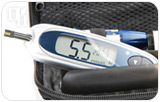Progesterone is a steroidal hormone that is particularly active during pregnancy and menstruation. It is also one of the three main hormonal players during menopause, alongside estrogen and testosterone. The level of progesterone in your body will vary throughout your lifetime, reaching a high during menstruation and pregnancy, and falling during menopause.

Low levels of progesterone can have a significant negative impact on the body. Effects of low progesterone range from breast tenderness, anxiety and weight gain, to depression and infertility. It is important that you take action for low progesterone levels, particularly at times when they are likely to be in flux, such as menopause. Read on to find out what you should do if you are experiencing low levels of progesterone.
Lifestyle Changes
There are various simple lifestyle changes you can make which will help counteract the effects of low progesterone levels:
- Regular exercise. Regular exercise will help combat symptoms of stress, anxiety and weight gain that you may be experiencing as a result of low levels of progesterone.
- Dietary changes. Certain foods boost progesterone production, including avocados, nuts and seeds, olives and oils. Eating foods that affect estrogen production, such as soy, apples, cherries, potatoes, rice, and wheat will also help balance out your hormone levels.
Making changes to your lifestyle can be initially difficult to incorporate into your daily routine, but if you can, then they can be very beneficial. However, while these solutions can be effective in tackling the symptoms of low progesterone, they do not solve the problem at a hormonal level.
Herbal Remedies
Herbal remedies are en effective, safe and natural way to combat the effects of low progesterone levels, at a hormonal level. There are two different kinds of herbal remedies:
- Phytoestrogenic herbs. Phytoestrogenic herbs include ginseng, dong quai, and black cohosh. They contain a natural estrogenic compound which helps balance the effects of low progesterone levels. However, prolonged use can be harmful, as introducing hormone-like substances can stop the body from producing its own hormones naturally.
- Hormone-regulating suplements. Hormone-regulating supplements, such as Macafem, combat low progesterone levels without introducing hormone-like substances into the body. These herbs stimulate hormone production by nourishing the glands which secrete hormones, leading the body to produce progesterone naturally.
Herbal remedies are an increasingly popular way to treat hormone imbalance and improve your levels of progesterone. Due to the risks associated with introducing phytoestrogens into the body, non-estrogenic herbs are a safer option, but both types are readily available and widely used.
Progesterone Replacement Therapy

Progesterone levels can be boosted medically through hormone replacement therapy (HRT). This will tackle the problem at a hormonal level immediately. However, there are dangerous and significant side effects associated with HRT; it is thought to lead to breast and ovarian cancers, and it has been linked with an increased risk of heart disease, blood clots, and strokes.
It is recommended that HRT is sought only when lifestyle changes and alternative treatments have already been exhausted, and that any drug treatment be carefully monitored under the advice of your doctor.
There are a number of options available to you if you are suffering low progesterone levels. The lifestyle changes pose the lowest risk of damaging side effects, so it is advisable to begin with these, and experiment with other remedies if the problem persists.
Click on the following link for more information on progesterone, what it does, and ways to combat progesterone imbalance.


